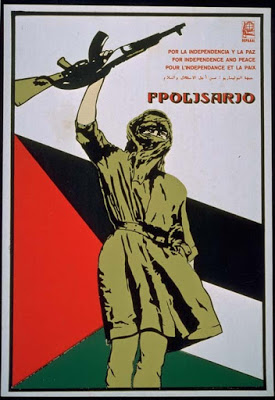May 10, birth of the POLISARIO Front
 |
| Emiliano Gómez 11/05/2020 |
The POLISARIO Front is a national liberation movement, it is not a political party and it is not a government.
Tradotto da Por un Sahara libre
It is the legitimate representative of the Saharawi people until they reach their independence. It is necessary to remember this fact due to its importance. The POLISARIO Front is now 47 years old. The wear and tear of armed struggle, but even more so, that of a Peace that is not peace for the Saharawis, is a huge burden that the POLISARIO Front has been able to bear and overcome.
Morocco’s various attempts to denigrate the image of the POLISARIO Front have a major objective: to stop having a legitimate interlocutor in the international arena.
Morocco tries to call into question the legitimacy of the representation of the POLISARIO Front both internationally and with internal interference and support for “dissidents” and “corrupt”. An old technique, older than the Roman empire.
The union of the Saharawi people, and the fact that the POLISARIO Front with all the problems arising from a conflict of almost 50 years, continue to have the support of its people is a stone the size of a mountain in the shoes of Morocco.
Historical background and foundation of Frente POLISARIO
umdraiga.com.- The socioeconomic changes that took place in the Spanish Sahara during the 60’s of the last century, led to the emergence of modern Sahrawi nationalism, based on national consciousness and not on tribalism; based on political arguments and not religious feelings.
In the first years of that decade, the nationalists formed diverse political groupings but none of them got to have decisive influence on the population. Only in 1967, an intellectual, Mohamed Sidi Ibrahim “Bassiri”, was able to gather around him a handful of supporters of independence and, the following year, he founded the Movement for the Liberation of the Sahara, (MLS).
In short, this clandestine organization already had hundreds of militants and began to influence the Saharawi population.
The MLS led by Bassiri promoted the peaceful demand for independence and won the support of various sectors of society: workers, officials of the colonial administration, students, non-commissioned officers and Saharawi soldiers framed in the colonial army, etc.
The nationalist activity began to manifest itself through strikes of workers, student mobilizations for the teaching of the Arabic language and through various acts of repudiation of the Spanish administration. Very soon the colonial intelligence service detected the existence of the movement so in 1969, the governor general of the Sahara decreed the curfew throughout the territory. Then there were many arrests of militants and supporters of MLS, some of which were expelled to neighboring countries.


